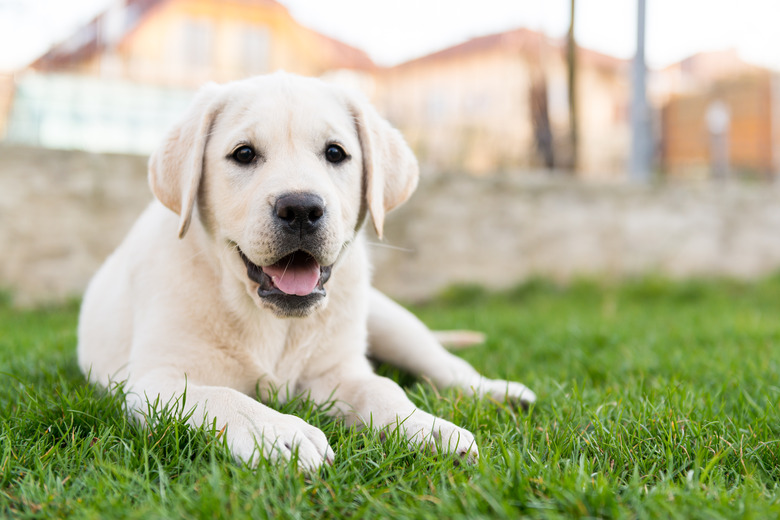Yellow Lab Lifespan: Here's How Long Yellow Labs Live
For 30 years, Labrador retrievers have been named the most popular dog out of 197 listed by the American Kennel Club (AKC). And no wonder. Whether they're yellow, chocolate, or black, Labs have pleasing personalities and are smart, outgoing, and friendly to everyone, including children and strangers. The average yellow Lab lifespan is the same as the average Labrador lifespan for all three colors: 10 to 12 or even 14 years. To help make sure labs live as long as possible, know the proper care to give them through all the Labrador life stages.
Identifying Labrador life stages
Identifying Labrador life stages
Unlike many dog breeds that are considered adults by 12 months of age, Labrador retrievers are still puppies at 18 to 24 months. Although they reach full height earlier, they can take almost two years to fill out their weight. They are also still very playful at two years old. Labs have so much energy that they need a lot of exercise, as puppies for sure, but even throughout their life stages.
As adults, Labs are still very energetic, and since they are known for being "good eaters," they need daily exercise to stay fit and maintain a healthy weight. You may start to see the signs of being senior dogs when Labs turn eight, but some don't show it until age 10. They may have slowed down a bit, may sleep more, and you may notice some gray hairs among their yellow coats. Senior dogs still need daily exercise, although a long walk may take the place of fetching and running.
Following nutrition guidelines
Following nutrition guidelines
Most vets recommend feeding Labrador retrievers food that is specifically designed for their puppy, adult, and senior stages. If you're going to supplement with human food and/or treats, make sure to count the calories of those, too, when determining how much to feed them. Labs are known for having good appetites, which means they can easily become overweight and unhealthy. In addition to putting a strain on their hearts and other organs, excess weight can bring out some of the problems Labs are known for, such as hip dysplasia. Male yellow Labs should weigh between 65 and 80 pounds; females should weigh between 55 and 70 pounds.
Adjusting food for senior dogs
Adjusting food for senior dogs
As much as you might want to, you cannot keep your Lab from aging; you can, though, help them to stay healthy as they age. Older dogs may have dental problems, such as cavities and tooth loss, that make it harder for them to chew. If you've been feeding dry food, switching to a good quality wet food may be easier for them to eat. Older dogs do not metabolize food as well, so they need about 20 percent less food each day to keep them from becoming overweight. They may also be less active, so they're not burning as many calories. If you're giving them less food, however, it's important that the food is packed with the nutrition they need. Do get them outside every day, though, even if they spend most of it enjoying a nap instead of the chasing and playing they did in their earlier years.
Some senior dogs lose weight, which can be a sign of illness, so consult your vet if you can't find a reason for the weight loss. If you notice that they're eating less but aren't acting ill, it could be a loss of appetite, which can happen as dogs age. Try making their food more appealing by adding a cooked egg, fruit, or a vegetable they like, diced to make a small amount go a long way and spread it throughout the dog food.
Avoiding foods toxic to dogs
Avoiding foods toxic to dogs
Labrador retrievers can enjoy many foods that humans eat, but there are also foods that should never be given to dogs because they have been proven to make dogs very ill and have even caused deaths. Foods that are toxic to dogs include avocado, grapes (raisins too!), mushrooms, onions, garlic, shallots, the green parts of potatoes and tomatoes, liver, the pits of peaches and plums, apple seeds, and many more. There are so many human foods your dog can eat, there's just no reason to experiment by giving your Lab something that might make them very ill.
Always check with your veterinarian before changing your pet's diet, medication, or physical activity routines. This information is not a substitute for a vet's opinion.
References
- American Kennel Club: Labrador Retriever
- Labrador Retriever Guide: Life Expectancy of Labrador Retrievers
- Cuteness: When Does a Dog Become a Senior Dog?
- Cuteness: What Should You Feed Older Dogs?
- American Kennel Club: Lab Most Popular Breed for 30th Straight Year; Frenchie Jumps to No. 2
- Cuteness: A List of Foods Dogs Can't Eat

